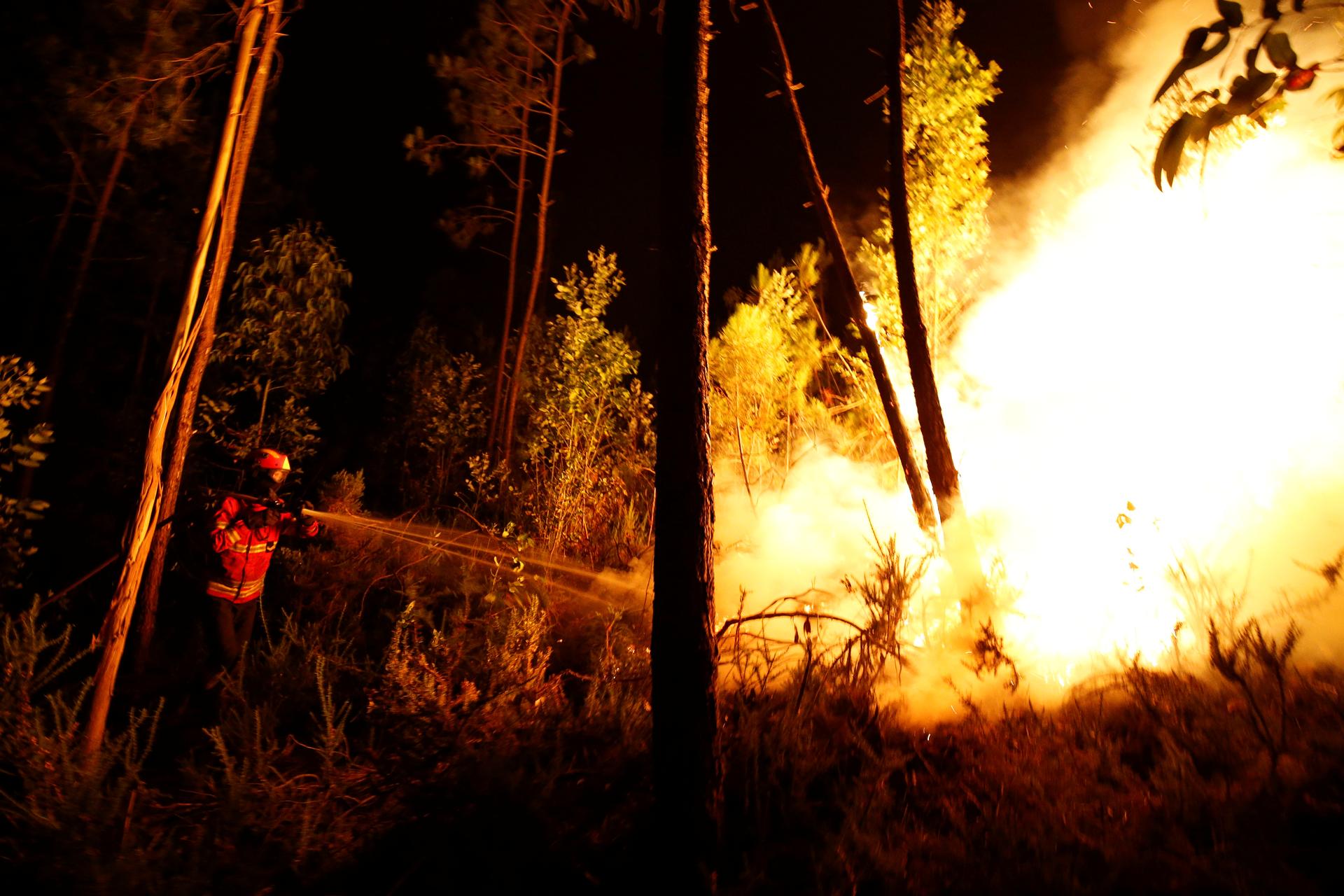‘Road of hell’: 62 dead as forest fire spreads in Portugal
Firefighters work to put out a forest fire near Bouca, in central Portugal.
More than 1,000 firefighters on Monday continue to battle a giant forest fire that swept through central Portugal at the weekend, killing at least 62 people.
The country is in mourning after the deadliest such disaster in its recent history, with many victims burnt as they were trapped in their cars around the epicenter in Pedrogao Grande.
"The fire has reached a level of human tragedy that we have never seen before," said a visibly moved Prime Minister Antonio Costa, who announced three days of mourning from Sunday.
Paul Ames, a freelance reporter based in Lisbon, characterizes the mood of the country right now as “in deep shock.’’
Portugal's national Route 236 has been transformed into a road of hell after the ferocious blaze ripped through the wooded countryside.
“The firefighters have been working around the clock,” says Ames, “Many of them have been working for several days now without a break.”
The international community has stepped in to help, with Spain, France and Italy sending water-bombing planes.
However, even with help of these planes, these fires are proving difficult to put out.
“The scale of these fires, the amount of smoke, and the unpredictable nature of the wind is really hampering those efforts,” says Ames “it’s really making it difficult for the plane to get in close to the fires where they need to be.”
"Our pain is immense," said Portuguese President Marcelo Rebelo de Sousa. "We feel a sense of injustice because the tragedy has hit those Portuguese of whom one speaks little — those living in an isolated rural zone."
'Everything burnt very quickly'
Police chief Almeida Rodrigues blamed dry thunderstorms for the blaze which broke out on Saturday in Pedrogao Grande, ruling out arson. "We found the tree hit by the lightning," he said.
"It was really hell. I thought the end of the world had come," said Maria de Fatima Nunes, a survivor.
The wooded hills in the area north of Lisbon, which 24 hours before had glowed bright green with eucalyptus and pine trees, were gutted by the flames.
The fire spread so quickly in part because eucalyptus trees, in particular, are very flammable.
“They have this kind of flaky bark” says reporter Paul Ames, “strips of bark fall off, and get pushed by the wind, and they burn very quickly, and that’s how the fire spreads.’
The disaster has brought all people together.
“Rich people, poor people, are donating to help rehouse those people who have lost their homes,” says Ames.
'We lost everything'
Secretary of State for the Interior Jorge Gomes said 18 of those burned to death had been trapped in their cars engulfed by flames on the road between Figueiro dos Vinhos and Castanheira de Pera.
Other bodies were found in houses in isolated areas. At least three villages near Pedrogao Grande were evacuated.
Another 62 people were injured, with five in a critical state including a child and four firefighters. France's foreign ministry said a French citizen was among those killed.
At a retirement home in Pedrogao Grande on Monday, about 150 people who had been evacuated or fled were waiting to learn when they could go home.
"We have people here who are waiting for news of their loved ones, who want to know and are really anxious," said Soledade Lourenco, 51, a nurse volunteering at the center.
Armindo Antonio, 67, a retiree who lives in Lisbon but has a home in nearby Louriceira, was sitting outside with a mask hanging around his neck.
"Some people stayed. Now we're waiting to see. From what they say, the village is still closed," he said. "We've heard everything burnt around our house but the house is ok. But we don't really know if that information is right. We just have to wait."
Portugal sweltered under a severe heatwave over the weekend, with temperatures topping 40 degrees Celsius (104 degrees Fahrenheit) in several regions.
“There was some hope this morning. There was some rain this morning,” says reporter Paul Ames, “But that hasn’t hasn’t put a break on the blaze for the moment.’’
For now he says, “the fires are still raging.”
Portugal was hit by a series of fires last year which devastated more than 100,000 hectares (1,000 square kilometers) of the mainland.
Fires on the tourist island of Madeira in August killed three people, while across 2016 around 40 homes were destroyed and 5,400 hectares of land burned.
